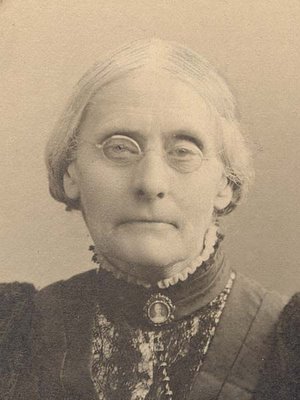
"I wonder if when I am under the sod - or cremated and floating in the air - I shall have to stir you and others up. How can you not be all on fire? . . . I really believe I shall explode if some of you young women don't wake up."
Susan B. Anthony, 1898
Fourteen years after Susan B. Anthony died in 1906, women won the right to vote. But one hundred years later, we are still only 15% of the U.S. Congress. (The U.S. is 59th in the world for the number of women in our national legislature. Sweden, South Africa and Rwanda all have more.) 107 men and 2 women have served on the U.S. Supreme Court.
Would a woman president change our political culture? With Michelle Bachelet elected president of Chile and Ellen Johnson Sirleaf president of Liberia (the 1st woman president in Africa), a New York Times article suggests voters wanted the kind of change these women were especially able to bring: "'We have been fighting wars for 15, 20 years in this region," said Rosaline M'Carthy, leader of the Women's Forum in Sierra Leone, who traveled here last week for the inauguration. 'To see the first female president elected from a war-torn country shows people are now beginning to see what men have wrought in this region. It is the minds of men that make war. Women are the architects of peace.' " ("Where Political Clout Demands a Maternal Touch," New York Times, Sunday, January 22, 2006.)
What would change if women made up more than 50% of the U.S. Congress? WEDO's 50/50 Campaign is inspired by evidence that a critical mass of elected women makes a difference:
"There is evidence however, that when women enter decision-making bodies in significant numbers, issues such as child care, violence against women and unpaid labor are more likely to become priorities for policy-makers. In Norway, women Members of Parliament brought about the "politics of care" which obligates the state to increase publicly sponsored child care services, extend the paid parental leave period, introduce options for more flexible work hours and improve pension rights for unpaid care work. In South Africa, through the efforts of women Parliamentarians the "women's budget process" was introduced to analyze the government's budget from a gender perspective and allocate more resources for women's needs. In India, the women chairpersons in the panchayats of Dehra Dun district in northern Uttar Pradesh obtained funds to build a network of four-foot wide concrete roads and drains."
What would Susan say?
"From the cradle the children of the manly woman and womanly man of the 20th century will be trained in the principles of good government. They will be taught that might is not right, either in the home or the state; that arbitration rather than human slaughter should settle all international difficulties." Susan B. Anthony, 1900

1 comment:
It's important not to confuse what "will" happen with what "should" happen. Let's face it, our government will continue to do a lot of things that should not be done. And, perhaps as Adam B. says, a woman will not get elected. But should a woman be president? I would argue that, even in times of conflict—perhaps especially in times of conflict—a woman should be president. I don't mean a woman who talks tough like a man, but a feminist who understands how to build consensus, bring voices to the table, and can understand the complexity of the issues our country faces.
It's ridiculous to me that people talk about George W. Bush being a strong leader when he has done so much to divide the country. A strong leader unites, not divides. Unfortunately, he's shown himself far more able to divide and conquer the American electorate than he has to defeat the Iraqi insurgency. In the process, we find ourselves in an incredibly rancorous political era, with our country and war effort suffering for it.
Feminist theory, the feminist lens for evaluating problems, is to seek resolution by bringing disparate perspectives to the table. Just imagine how much more coherent our approach in Iraq could be if the president had listened to more perspectives than simply Cheney and Rumsfeld. A woman, feminist president would never find herself relying on two trusted advisors.
So our country might be too scared, too terrorized by our own government, to see beyond tough-talk cowboy language. But, if we want to win the war on terror and strengthen our civic spirit, then we should elect a woman president
Post a Comment